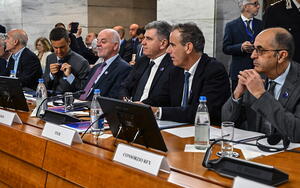In Rome meeting, fusion is a priority
At the inaugural ministerial meeting of the World Fusion Energy Group (WFEG) on 6 November in Rome, participants agreed that bringing fusion to commercialization will require cross-border and cross-sector collaboration.
Hosted by the International Atomic Energy Agency (IAEA) and Italy, the event assembled the representatives of IAEA member countries as well as private sector actors, international organizations—including ITER—and non-governmental organizations.
“We share a common goal: to hasten the pathway toward the deployment of nuclear fusion as a reliable source of power,” stated ITER Director-General Pietro Barabaschi in his remarks. “It is our commitment to this assembly of global leaders to support the IAEA’s vision of driving multi-sector collaboration, and attention on the policies and frameworks needed for fusion.”
The World Fusion Energy Group was launched by the IAEA a year ago with the idea of bringing together public and private sectors, industry, academia and civil society to form a cohesive global fusion community. The group seeks to act as a catalyst for fusion energy commercialization by fostering international collaboration through dialogue and planning, identifying technology and engineering gaps and developing solutions, promoting discussion on effective fusion regulation, and raising public awareness and engagement.
Discussions in Rome focused on three main topics: the status of fusion energy research and initiatives, global collaboration and public-private partnerships, and issues around creating the specialized workforce and supply chain that will be necessary to sustain fusion commercialization.
“The strong attendance at today’s meeting clearly demonstrates the growing optimism about the immense potential of fusion energy as a long-term clean energy solution,” said IAEA Director General Rafael Mariano Grossi. “Until recently, fusion energy had been a distant dream, but now with burgeoning private sector involvement and major technical breakthroughs, it seems fusion's realization is now within reach.”
The IAEA released two new publications during the meeting that highlight the momentum underway—the World Fusion Outlook 2024 and Fusion Key Elements.
In a panel called “Fusion Energy: State of Play,” Pietro Barabaschi repeated a pledge to support private sector fusion initiatives by sharing technical expertise and experience. In May 2024, ITER had organized a Private Sector Fusion Workshop for the first time; since then, an organized program for knowledge transfer has been launched (see a more detailed description in next week’s ITER Newsline).
On the sidelines of the World Fusion Energy Group meeting, Director-General Barabaschi and Director General Grossi signed a new Memorandum of Understanding, strengthening cooperation on fusion. The agreement promotes knowledge exchange, education and training, and global outreach to advance fusion energy, expanding a long history of cooperation between the two organizations.
See a press release in English or watch the press conference that followed the event.



